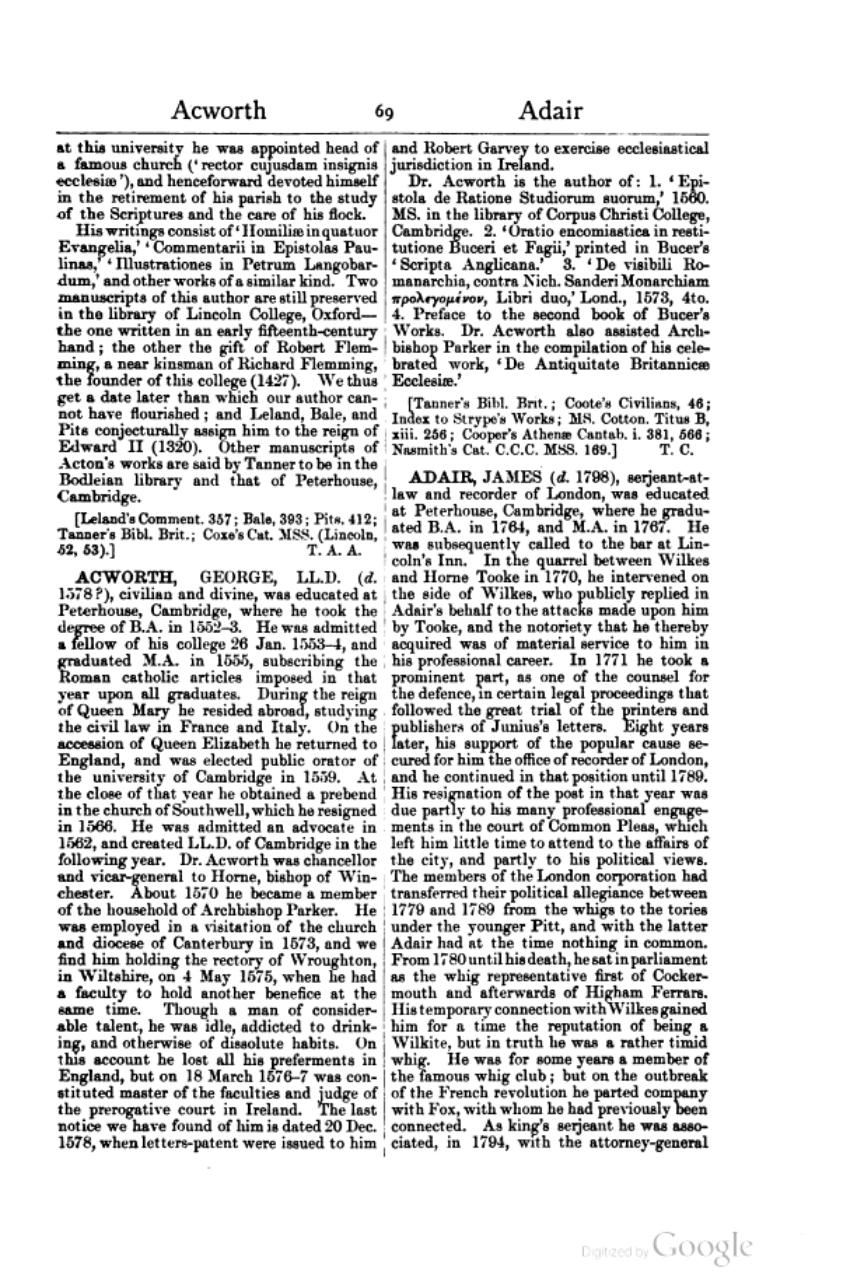at this university he was appointed head of a famous church (‘rector cujusdam insignis ecclesiæ’), and henceforward devoted himself in the retirement of his parish to the study of the Scriptures and the care of his flock.
His writings consist of ‘Homiliæ in quatuor Evangelia,’ ‘Commentarii in Epistolas Paulinas,’ ‘Illustrationes in Petrum Langobardum,’ and other works of a similar kind. Two manuscripts of this author are still preserved in the library of Lincoln College, Oxford—the one written in an early fifteenth-century hand; the other the gift of Robert Flemming, a near kinsman of Richard Flemming, the founder of this college (1427). We thus get a date later than which our author cannot have flourished; and Leland, Bale, and Pits conjecturally assign him to the reign of Edward II (1320). Other manuscripts of Acton's works are said by Tanner to be in the Bodleian library and that of Peterhouse, Cambridge.
[Leland's Comment. 357; Bale, 393; Pits, 412; Tanner's Bibl. Brit.; Coxe's Cat. MSS. (Lincoln, 52, 53).]
ACWORTH, GEORGE, LL.D. (d. 1578?), civilian and divine, was educated at Peterhouse, Cambridge, where he took the degree of B.A. in 1552–3. He was admitted a fellow of his college 26 Jan. 1553–4, and graduated M.A. in 1555, subscribing the Roman catholic articles imposed in that year upon all graduates. During the reign of Queen Mary he resided abroad, studying the civil law in France and Italy. On the accession of Queen Elizabeth he returned to England, and was elected public orator of the university of Cambridge in 1559. At the close of that year he obtained a prebend in the church of Southwell, which he resigned in 1566. He was admitted an advocate in 1562, and created LL.D. of Cambridge in the following year. Dr. Acworth was chancellor and vicar-general to Horne, bishop of Winchester. About 1570 he became a member of the household of Archbishop Parker. He was employed in a visitation of the church and diocese of Canterbury in 1573, and we find him holding the rectory of Wroughton, in Wiltshire, on 4 May 1575, when he had a faculty to hold another benefice at the same time. Though a man of considerable talent, he was idle, addicted to drinking, and otherwise of dissolute habits. On this account he lost all his preferments in England, but on 18 March 1576–7 was constituted master of the faculties and judge of the prerogative court in Ireland. The last notice we have found of him is dated 20 Dec. 1578, when letters-patent were issued to him and Robert Garvey to exercise ecclesiastical jurisdiction in Ireland.
Dr. Acworth is the author of: 1. ‘Epistola de Ratione Studiorum suorum,’ 1560. MS. in the library of Corpus Christi College, Cambridge. 2. ‘Oratio encomiastica in restitutione Buceri et Fagii,’ printed in Bucer's ‘Scripta Anglicana.’ 3. ‘De visibili Romanarchia, contra Nich. Sanderi Monarchiam προλεγομἐνον, Libri duo,’ Lond., 1573, 4to. 4. Preface to the second book of Bucer's Works. Dr. Acworth also assisted Archbishop Parker in the compilation of his celebrated work, ‘De Antiquitate Britannicæ Ecclesiæ.’
[Tanner's Bibl. Brit.; Coote's Civilians, 46; Index to Strype's Works; MS. Cotton. Titus B, xiii. 256; Cooper's Athenæ Cantab, i. 381, 566; Nasmith's Cat. C.C.C. MSS. 169.]
ADAIR, JAMES (d. 1798), serjeant-at-law and recorder of London, was educated at Peterhouse, Cambridge, where he graduated B.A. in 1764, and M.A. in 1767. He was subsequently called to the bar at Lincoln's Inn. In the quarrel between Wilkes and Horne Tooke in 1770, he intervened on the side of Wilkes, who publicly replied in Adair's behalf to the attacks made upon him by Tooke, and the notoriety that he thereby acquired was of material service to him in his professional career. In 1771 he took a prominent part, as one of the counsel for the defence, in certain legal proceedings that followed the great trial of the printers and publishers of Junius's letters. Eight years later, his support of the popular cause secured for him the office of recorder of London, and he continued in that position until 1789. His resignation of the post in that year was due partly to his many professional engagements in the court of Common Pleas, which left him little time to attend to the affairs of the city, and partly to his political views. The members of the London corporation had transferred their political allegiance between 1779 and 1789 from the whigs to the tories under the younger Pitt, and with the latter Adair had at the time nothing in common. From 1780 until his death, he sat in parliament as the whig representative first of Cockermouth and afterwards of Higham Ferrers. His temporary connection with Wilkes gained him for a time the reputation of being a Wilkite, but he was a rather timid whig. He was for some years a member of the famous whig club; but on the outbreak of the French revolution he parted company with Fox, with whom he had previously been connected. As king's serjeant he was associated, in 1794, with the attorney-general
